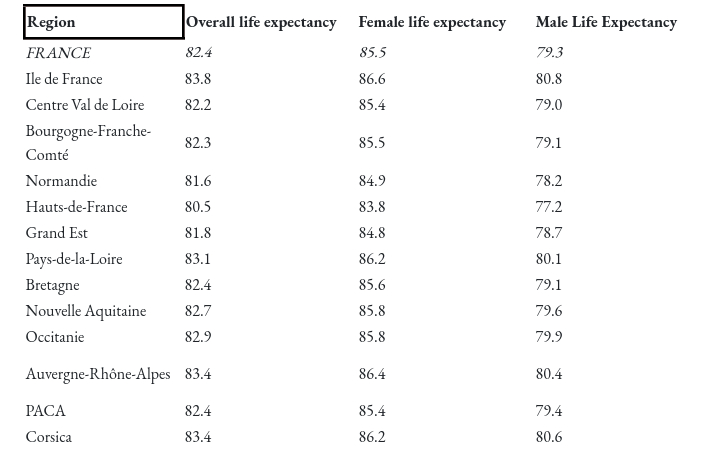Why do people in the Paris region live longer?

You might think the air pollution, urban stress and rats were not conducive to a long life - but in fact the people of the greater Paris region have the longest life expectancy in France.
The fresh, clear air of the Alps, or perhaps the mild winters and fresh fruit and vegetables of the Mediterranean might conjour up images of a long-living population.
But while France as a whole has one of the longer life expectancies of Europe, it is the residents of the greater Paris Île-de-France region who live the longest, according to new Eurostat data.
The region
Île-de-France is the region around the capital, but it's not just Paris - it covers 12,000 square kilometres and includes several forests and natural parks.
It consists of eight départements - Paris itself, the three départements of the petite couronne or inner suburbs (Seine-Saint-Denis, Vals-de-Marne and Hauts-de-Seine) plus the more suburban and rural areas of Essonne, Yvelines, Seine-et-Marne and Val d'Oise.
It contains the one of the wealthiest départements in France - Paris - and one of the poorest - Seine-Saint-Denis.

Life expectancy
Overall France's life expectancy at birth is 82.4 years - over the EU average of 80.1 but behind neighbours Spain and Italy. The comparable data from the UK from 2021 is a life expectancy of 80.9, while the USA is 77.3.
In 2021, the overall life expectancy at birth in the EU was 80.1 years. The life expectancy for women was 82.9 years.👵
Highest for women in:
🇪🇸Comunidad de Madrid (88.2 years)
🇪🇸Comunidad Foral de Navarra (87.6 years)
Read the news article👉https://t.co/VvTdWxGOWM#EurostatRYB pic.twitter.com/Pu6BlTLGRp
— EU_Eurostat (@EU_Eurostat) November 6, 2023
But the Eurostat data also breaks down life expectancy by mainland France's 13 regions, and the one that has the highest life expectancy is Île-de-France - men in the region have a life expectancy of 80.6 while women live to be 88.6 on average.

Life expectancy by region in France. Data: Eurostat, Chart: The Local
Why?
Overall, the French data is in line with other European data which suggests that people in the big cities live longer - the area in Europe with the longest life expectancy is Spanish capital Madrid.
Healthcare - A major factor in this is healthcare, both emergency care and routine care. Emergency care benefits from proximity to hospitals, for example for heart attack victims.
France also has an issue of ‘medical deserts’ where there is a shortage of GPs and other routine healthcare. Although these do affect some urban areas, including Seine-Saint-Denis in the greater Paris area, they are a recognised problem in rural areas, making it harder for people to get routine healthcare and regular check-ups.
Wealth - Overall health trends indicate that well-off people are likely to have better health than poor people, and that’s true even in countries like France where healthcare is partially or entirely funded by the state.
France's economy is notoriously lopsided with wealth heavily concentrated around the capital - in 2019 GDP per head in Île-de-France was €67,926 - way ahead of the second richest region Auvergne-Rhône-Alpes on €42,617. There are pockets of poverty in the region - notably France's most deprived département of Seine-Saint-Denis, but people in and around the capital are statistically more likely to be financially well-off.
France’s poorest region - Hauts-de-France in the north east - has the lowest life expectancy, at 80.5. This is, however, the former industrial and coal-mining area so there’s likely to be a legacy of industrial disease among people who worked in factories and coal mines.
Lifestyle - When we look at general health the cities often fare better - even though you might think the rural lifestyle sounds healthier, in fact people walk a lot more in the cities, rather than taking the car, and the areas of France where people eat the highest amount of convenience foods and ready meals tend to be rural.
Île-de-France also has the lowest rates of smoking and drinking in France, and the joint lowest obesity rate (with Brittany).
Comments
See Also
The fresh, clear air of the Alps, or perhaps the mild winters and fresh fruit and vegetables of the Mediterranean might conjour up images of a long-living population.
But while France as a whole has one of the longer life expectancies of Europe, it is the residents of the greater Paris Île-de-France region who live the longest, according to new Eurostat data.
The region
Île-de-France is the region around the capital, but it's not just Paris - it covers 12,000 square kilometres and includes several forests and natural parks.
It consists of eight départements - Paris itself, the three départements of the petite couronne or inner suburbs (Seine-Saint-Denis, Vals-de-Marne and Hauts-de-Seine) plus the more suburban and rural areas of Essonne, Yvelines, Seine-et-Marne and Val d'Oise.
It contains the one of the wealthiest départements in France - Paris - and one of the poorest - Seine-Saint-Denis.

Life expectancy
Overall France's life expectancy at birth is 82.4 years - over the EU average of 80.1 but behind neighbours Spain and Italy. The comparable data from the UK from 2021 is a life expectancy of 80.9, while the USA is 77.3.
In 2021, the overall life expectancy at birth in the EU was 80.1 years. The life expectancy for women was 82.9 years.👵
— EU_Eurostat (@EU_Eurostat) November 6, 2023
Highest for women in:
🇪🇸Comunidad de Madrid (88.2 years)
🇪🇸Comunidad Foral de Navarra (87.6 years)
Read the news article👉https://t.co/VvTdWxGOWM#EurostatRYB pic.twitter.com/Pu6BlTLGRp
But the Eurostat data also breaks down life expectancy by mainland France's 13 regions, and the one that has the highest life expectancy is Île-de-France - men in the region have a life expectancy of 80.6 while women live to be 88.6 on average.

Why?
Overall, the French data is in line with other European data which suggests that people in the big cities live longer - the area in Europe with the longest life expectancy is Spanish capital Madrid.
Healthcare - A major factor in this is healthcare, both emergency care and routine care. Emergency care benefits from proximity to hospitals, for example for heart attack victims.
France also has an issue of ‘medical deserts’ where there is a shortage of GPs and other routine healthcare. Although these do affect some urban areas, including Seine-Saint-Denis in the greater Paris area, they are a recognised problem in rural areas, making it harder for people to get routine healthcare and regular check-ups.
Wealth - Overall health trends indicate that well-off people are likely to have better health than poor people, and that’s true even in countries like France where healthcare is partially or entirely funded by the state.
France's economy is notoriously lopsided with wealth heavily concentrated around the capital - in 2019 GDP per head in Île-de-France was €67,926 - way ahead of the second richest region Auvergne-Rhône-Alpes on €42,617. There are pockets of poverty in the region - notably France's most deprived département of Seine-Saint-Denis, but people in and around the capital are statistically more likely to be financially well-off.
France’s poorest region - Hauts-de-France in the north east - has the lowest life expectancy, at 80.5. This is, however, the former industrial and coal-mining area so there’s likely to be a legacy of industrial disease among people who worked in factories and coal mines.
Lifestyle - When we look at general health the cities often fare better - even though you might think the rural lifestyle sounds healthier, in fact people walk a lot more in the cities, rather than taking the car, and the areas of France where people eat the highest amount of convenience foods and ready meals tend to be rural.
Île-de-France also has the lowest rates of smoking and drinking in France, and the joint lowest obesity rate (with Brittany).
Join the conversation in our comments section below. Share your own views and experience and if you have a question or suggestion for our journalists then email us at [email protected].
Please keep comments civil, constructive and on topic – and make sure to read our terms of use before getting involved.
Please log in here to leave a comment.